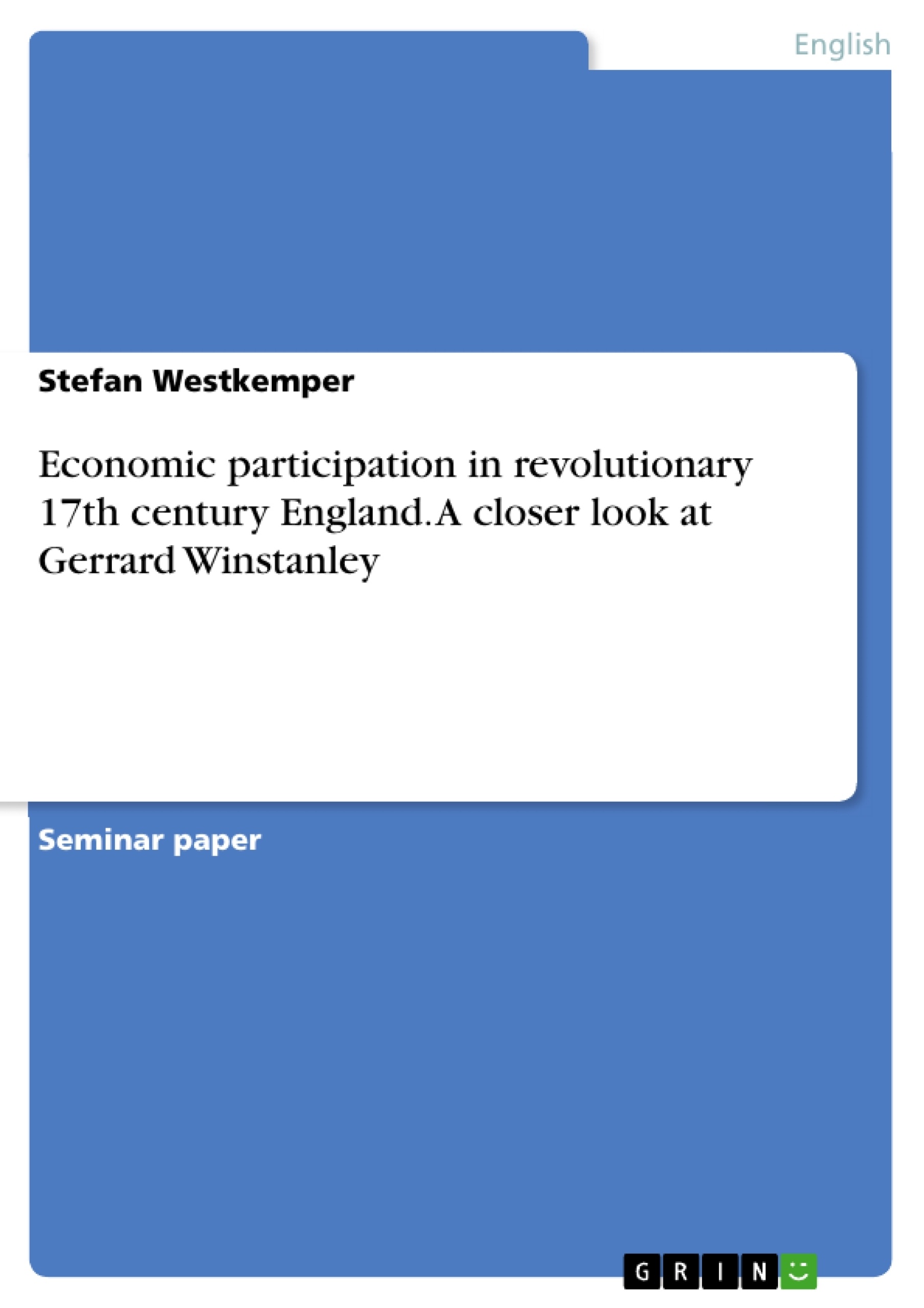[...] Therefore, the aim of this paper is to have a closer look at one radical vision of political and economic participation in England put forward by George Winstanley after the execution of Charles I. In order to show Winstanley’s unique status among seventeenth-century political philosophers, I will make use of and quote some of Winstanley’s many writings and pamphlets, e.g. The Law of Freedom in a Platform and An Appeale to all Englishmen.
First, the main ideas and concepts of Winstanley are going to be discussed in order to, in a second step, compare them and to point out the main differences. Since this paper is restricted in its length, I can only point out the main ideas and concepts of Winstanley. The events of the English Civil War(s) or the later Commonwealth will not be discussed in this paper, since they function only as the backdrop to Winstanley’s political theories and should be familiar to the reader. [...]
Inhaltsverzeichnis (Table of Contents)
- Introduction
- The Writings of Gerrard Winstanley
- Winstanley's Idea of Freedom
- The Norman Yoke
- Winstanley's Concept of a 'Communist' Society
- Conclusion
- Works Cited
Zielsetzung und Themenschwerpunkte (Objectives and Key Themes)
This paper explores the radical vision of political and economic participation in England presented by Gerrard Winstanley following the execution of Charles I. The paper aims to analyze Winstanley's unique position within the context of seventeenth-century political philosophy by examining his writings, particularly "The Law of Freedom in a Platform" and "An Appeale to all Englishmen." Through a close reading of Winstanley's ideas, the paper aims to highlight the main concepts he put forward and compare them to other contemporary political thinkers.
- Winstanley's concept of freedom and its biblical roots
- The Norman Yoke and its implications for economic and political participation
- Winstanley's vision of a “communist” society and the concept of "creation birth-right"
- Winstanley's call for the inclusion of all people, regardless of social status, in political and economic participation
- The role of the English Civil War as a backdrop to Winstanley's political theories
Zusammenfassung der Kapitel (Chapter Summaries)
The first chapter delves into the context of Winstanley's ideas, highlighting the ambiguity of Aristotle's views on government and contrasting them with the clear understanding of the Parliamentarians in seventeenth-century England. It explains the conflict between Parliament and the King, leading to the Civil War and the need for a new order. The paper emphasizes the significance of Winstanley's unique vision of political and economic participation.
The second chapter focuses on Winstanley's writings, exploring his idea of freedom, the concept of the Norman Yoke, and his vision of an equal society. It examines four key forms of freedom attributed to Winstanley: freedom of trade, freedom of conscience, sexual freedom, and freedom from landlords. The chapter also includes Davies's addition of freedom of speech to the list. While the paper acknowledges the importance of all these concepts, it emphasizes the focus on Winstanley's conception of economic freedom due to the limitations of its length.
The third chapter further examines Winstanley's idea of freedom, highlighting its biblical origins and its relation to the concept of “creation birth-right." The chapter contrasts Winstanley's vision of inclusion with the views of the Levellers, who sought to redistribute the parliamentary franchise based on economic status. It emphasizes Winstanley's radical call for the inclusion of all people in political and economic participation, regardless of social status.
Schlüsselwörter (Keywords)
This paper focuses on the key concepts of economic participation, freedom, social equality, and political representation in revolutionary England. It examines the writings of Gerrard Winstanley, a radical political thinker who advocated for a "communist" society based on biblical principles. Key themes explored include the Norman Yoke, creation birth-right, and the role of religious beliefs in shaping political ideology. The paper highlights Winstanley's unique position within the context of seventeenth-century political philosophy and his radical vision for a more inclusive and equitable society.
Frequently Asked Questions
Who was Gerrard Winstanley?
Winstanley was a radical 17th-century political philosopher and leader of the "Diggers" who advocated for social equality and communal land ownership in England.
What is the "Norman Yoke" concept?
It is the theory that the English people lost their native liberties and land rights during the Norman Conquest in 1066, which Winstanley sought to overturn.
What does Winstanley mean by "creation birth-right"?
This concept asserts that all human beings have an inherent right to use the earth for their sustenance, regardless of their social or economic status.
How did Winstanley's views differ from the Levellers?
While the Levellers focused on political reform and widening the franchise based on property, Winstanley called for radical economic equality and communal living.
Which primary writings of Winstanley are analyzed in this paper?
The paper examines "The Law of Freedom in a Platform" and "An Appeale to all Englishmen."
- Citation du texte
- M.Ed. Stefan Westkemper (Auteur), 2012, Economic participation in revolutionary 17th century England. A closer look at Gerrard Winstanley, Munich, GRIN Verlag, https://www.grin.com/document/272400



